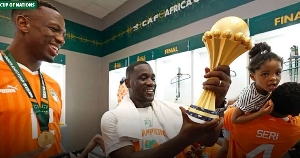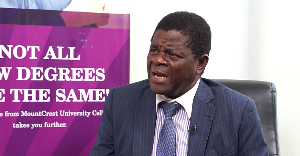Emerse Fae says guiding Ivory Coast to the 2023 Africa Cup of Nations title on home soil feels like "revenge" after he was forced to retire from playing early.
The 40-year-old was named as interim coach of the Elephants midway through the tournament, and capped a remarkable run through the knockout stages with a 2-1 win over Nigeria on Sunday.
Fae was part of the Ivorian side that finished runners-up at the 2006 Nations Cup finals - a campaign in which he played in every match - but had hung up his boots because of vein inflammation issues in his legs by the time the West Africans lifted the trophy in 2015.
"It's a revenge for me, on football and on life in general, because I had to stop playing at 28 as it was jeopardising my health," Fae told Newsday on the BBC World Service.
"Since then, I've decided I was going to win every trophy as a manager that I did not win as a player. I had this idea in mind for a very long time."
Ivory Coast had trailed in their last-16 tie against Senegal and their quarter-final against Mali but scored late equalisers in both games before beating the former on penalties and the latter with a 122nd-minute winner.
The Elephants also fell behind against Nigeria in the final, but second-half goals from Franck Kessie and Sebastien Haller sealed their third continental title and provided a fairytale ending for the side and Fae.
Ivorian President Alassane Ouattara joined in post-match celebrations at the stadium bearing his name before thousands of fans lined the streets of Abidjan on Monday for a trophy parade.
"It will take some time to soak it in," Fae said.
"President Ouattara said a massive thank you and he congratulated me. It was important for the country to win this tournament."
A victory for the family
Fae was born in Nantes and was a youth international for France, winning the Under-17 World Championship in 2001 - beating Nigeria in the final.
He played for his home-town club before switching allegiance to Ivory Coast,, external the land of his parents, in 2005. Spells at Reading, then in the Premier League, and Nice followed before he retired in 2012.
Fae coached Nice's youth teams and the reserve side of French Ligue 1 club Clermont before being appointed as Gasset's assistant in May 2022.
His family have shared what was an emotional triumph in just his fourth game as a senior manager - although his father was "too stressed" to travel to Abidjan to witness it in person and his mother is sadly no longer alive.
"I asked my dad, who's in Nantes, if he wanted to jump on a plane to come and watch the final but he said he couldn't cope with the pressure," Fae said.
"He had to watch the game on his own, in his house, with no-one around. It means a lot for my family as well.
"My mum had a lot of sisters so I have a lot of cousins here in Ivory Coast that went through the whole competition.
"They were with me, encouraging us, texting me. They saw what I went through throughout the years as well, when my mother died, so this victory is for them as well."
How Fae fixed 'broken' Elephants
Fae has been given 100 million CFA francs ($163,000) for masterminding Ivory Coast's turnaround after replacing Jean-Louis Gasset in the dugout following the 4-0 defeat by Equatorial Guinea in their final group match.
That result left the Ivorians on the brink of an embarrassing early exit from the tournament - yet the Elephants received a second life when other results when their way and they sneaked through as the last of four best-ranked third-placed sides.
Fae inherited a dressing room which was "in disbelief" after that loss against the Equatoguineans - both Ivory Coast's heaviest on home soil and at the Nations Cup finals - but revived a squad which subsequently showed depths of mental and physical strength to reach the final and lift the silverware.
"There was a lot of sadness. We wanted to show the world that we could be better than that," Fae said.
"I told the players that we needed to forget about it and move on, leaving the group stages behind us.
"The team was broken in two, a sense that there was no cohesion on the pitch, so we needed more unity, solidarity and to put in place a more compact bloc.
"In the round of 16, people thought we were obviously going to lose against Senegal, one of the best teams of the tournament, but we really wanted to show the world that we could do it."
Africa Sports News of Wednesday, 14 February 2024
Source: bbc.com

















